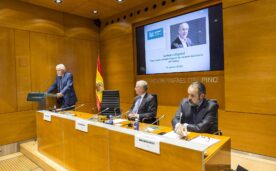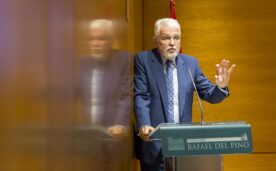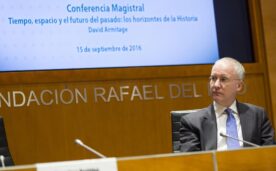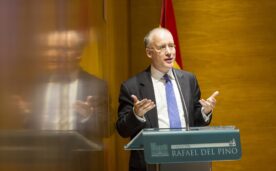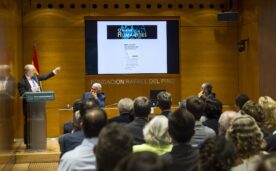Time, Space and the Future of the Past: the Horizons of History
Summary:
On 16 September, the Rafael del Pino Foundation organised the conference "Time, Space and the Future of the Past: The Horizons of History", given by David Armitage, Lloyd C. Blankfein Professor of History at Harvard University. In his lecture, David Armitage appealed to historians and anyone interested in the role of history in contemporary society because of the need to recover and revitalise this branch of knowledge as an instrument of knowledge and a tool for the better development of humanity. Armitage pointed out that the humanities are in crisis around the world due to the much better employment prospects offered by science and the constant cutback in resources that humanities faculties have experienced. The result is a 50% drop in the number of students enrolled in them in the US in recent years. History, however, is a very useful instrument of long-term analysis for politicians, activists, businessmen, etc. This focus on the long term can be used to draw analogies and make plausible prospections that help society to better anticipate and manage the challenges of the future. History unfolds the analysis of the past in the present to provide guidance on the future and the possible paths that lie ahead. Armitage even stated that the President of the United States needs a council of advisors in history to shed light on current challenges and decisions. In this regard, he recounted that President Kennedy kept a history of World War I at his bedside, so as not to repeat the misinformation that led to it, which inspired him in his handling of the Cuban missile crisis. Kennedy wanted the Soviet Union to be kept informed at all times in order to avoid catastrophe, and he succeeded. Historians may have been partly to blame for the decline of their discipline, but also partly because of pressure from other groups, especially economists, to advise. Historians, Armitage believes, need to broaden their field in time and space, to return to transnational narratives in search of common denominators, and to transtemporal narratives that allow connections to be made over time. In this sense, historical discourse must go beyond national states and their limitations in order to take a broader view of events and broad underlying trends.
The Rafael del Pino Foundation is not responsible for the comments, opinions or statements made by the people who participate in its activities and which are expressed as a result of their inalienable right to freedom of expression and under their sole responsibility. The contents included in the summary of this conference are the result of the debates held at the meeting held for this purpose at the Foundation and are the responsibility of their authors.
The Rafael del Pino Foundation is not responsible for any comments, opinions or statements made by third parties. In this respect, the FRP is not obliged to monitor the views expressed by such third parties who participate in its activities and which are expressed as a result of their inalienable right to freedom of expression and under their own responsibility. The contents included in the summary of this conference are the result of the discussions that took place during the conference organised for this purpose at the Foundation and are the sole responsibility of its authors.
